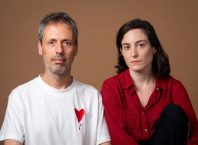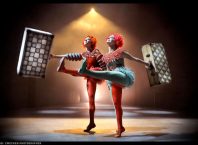Writing is a lonely art. Unlike the numerous other forms of art lavishly chronicled in this arts-fartsy online magazine—genres of art performed before smiling, clapping, admiring audiences—the things you read were almost always written by some poor lonely soul, sitting in a room by him or herself, working alone. Actors, dancers, singers, musicians, performance artists and mimes: they all get their fix of the addictive drug of applause at the end of their shows. Even beat poets could expect their early-1950s coffee house audiences to snap their fingers and hiss appreciatively at the end of one of their angry little poems.
Okay, so painters and sculptors work alone in their studios. But even they get to meet up with their audiences sooner or later, especially on the opening nights of their gallery exhibitions. Yes, even they—often even weirder and more dysfunctionally misanthropic than writers—get to hear the ‘oooos’, ‘ahhhs,’ and occasional ‘what-the-fucks’ from living, breathing, human beings wandering around the galleries, looking at their creations.
Not us. We never see our audiences, have no idea who they are, can’t begin to imagine what they look like, or are ever really certain that they even exist. I mean, when was the last time you were reading a novel, happened to glance up, and saw the book’s author sitting in front of you, watching your face as you read? Imagine sitting someplace, happily reading The Family Moskat or The Magician of Lublin and there is Isaac Bashevis Singer, looking over your shoulder, pointing to passages he wants you to read again—only more slowly this time—and asking you if you’d like maybe a couple of blintzes and a nice glass of tea.
No, my friends, writing is a lonely art—and in my case, that is probably just as well. If I had an audience while I was doing this, I can only imagine what they would likely see during a more or less typical ‘performance.’ They’d see me type a few words, go to Facebook, type a few wise-ass comments to friends’ posts, check my email account, see no new messages, go to my other email account, see no new messages there either, go back to my writing, type a few more words, get up to make coffee, spill half of it all over myself when I bring it back to my desk, type a few sentences, get up to scratch myself someplace I can’t reach while sitting down, sit down and drink coffee, go back to Facebook, return the Facebook “poke” of an old high school friend who pokes me every day, visit my latest article on the Jerusalem Post website, type a few more sentences, scratch my armpits, Google myself to see if there are any new entries, listen to a couple of tunes while looking at…well, never mind at what, type a few more sentences, break for lunch. As the stage lights slowly dim, the curtain falls to thunderous applause. I take multiple bows and curtain calls, and then I take a nap.
What—you think it would be more interesting if I were somehow more ‘focused’ and worked more steadily? Do you really think an audience would be at the edge of their seats, riveted by the spectacle of me frowning with concentration as I just sit here and type? Spilling hot coffee all over myself at least provides a grain of entertainment—if you’re into slapstick comedy—and people pay good money to go to zoos and watch chimpanzees and orangutans scratch themselves, so why not come and watch me?
I am certainly more entertaining than, say, the Roman poet Virgil, who is said to have written no more than three lines of poetry per day. That’s right, his epic poem The Aeneid, written three lines per day. Imagine an audience coming to watch that one. Before they’re even seated and settled, three lines, all done, that’s it for today. Thank you very much. You’ve been a great audience. Now get the fuck out of here.
Of course, when you are coming up with only three lines of writing per day, that writing is probably going to be fantastic. Sure enough, Vergil’s Latin sang and roared with alliteration, assonance, onomatopoeia and meter, not to mention every literary device known to mankind—from metaphor to metonymy, and from simile to synecdoche. He could write about the blast of a trumpet in words that sounded more like a trumpet than, well, a trumpet. His use of meter and onomatopoeia to describe the sound of horses galloping across a dusty plain could make you both hear and feel the hoof beats. If any writer should have had an audience, it was Virgil. They would not have sat there for very long, but in the short time that they were there they would have seen a writers’ writer write.
Dear readers, I cannot write like Virgil. I am simply not that good. I will never be watched by an admiring audience, or surrounded by adoring fans. My writing is not adorable. But if you ever feel like performing an act of loving kindness that is certain to get you into Heaven, then this is what you can do: The next time you see me, smile very quickly, clap your hands once, or just snap your fingers and hiss.






Your “typical performance’ paragraph has so much “stage presence” in it’s own way.. so very you Carl. As I said, quite adorable.
I like everything in this writing except a line of swearing. But I swear I will not hiss when I see Carl Hoffman the writer for he is more than just a writer. He is THE WRITER and a very adorable one too. So, are writers closet actors Carl? Because writers are very theatrical sometimes and they move me from my seat from time to time…
It is true about writers..You may have a lot more followers but you never see your audience. Thanks for this excellent writing piecw. I enjoyed your wit and sense of humor!!e
Love your writing and your sense of humor. Excellent and necessary article.
Such an insight into the writer’s world! Thanks, great article.
Comments are closed.